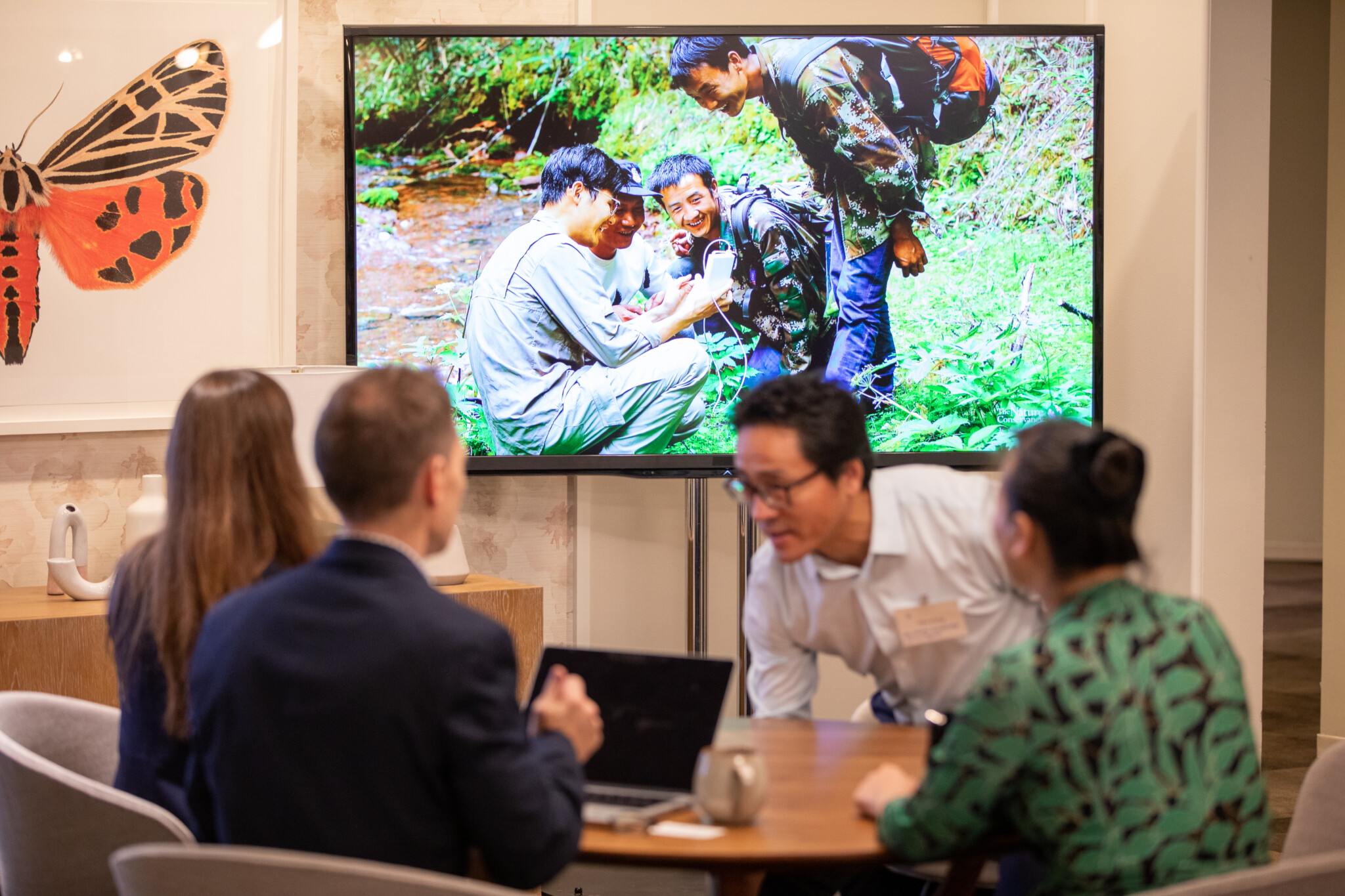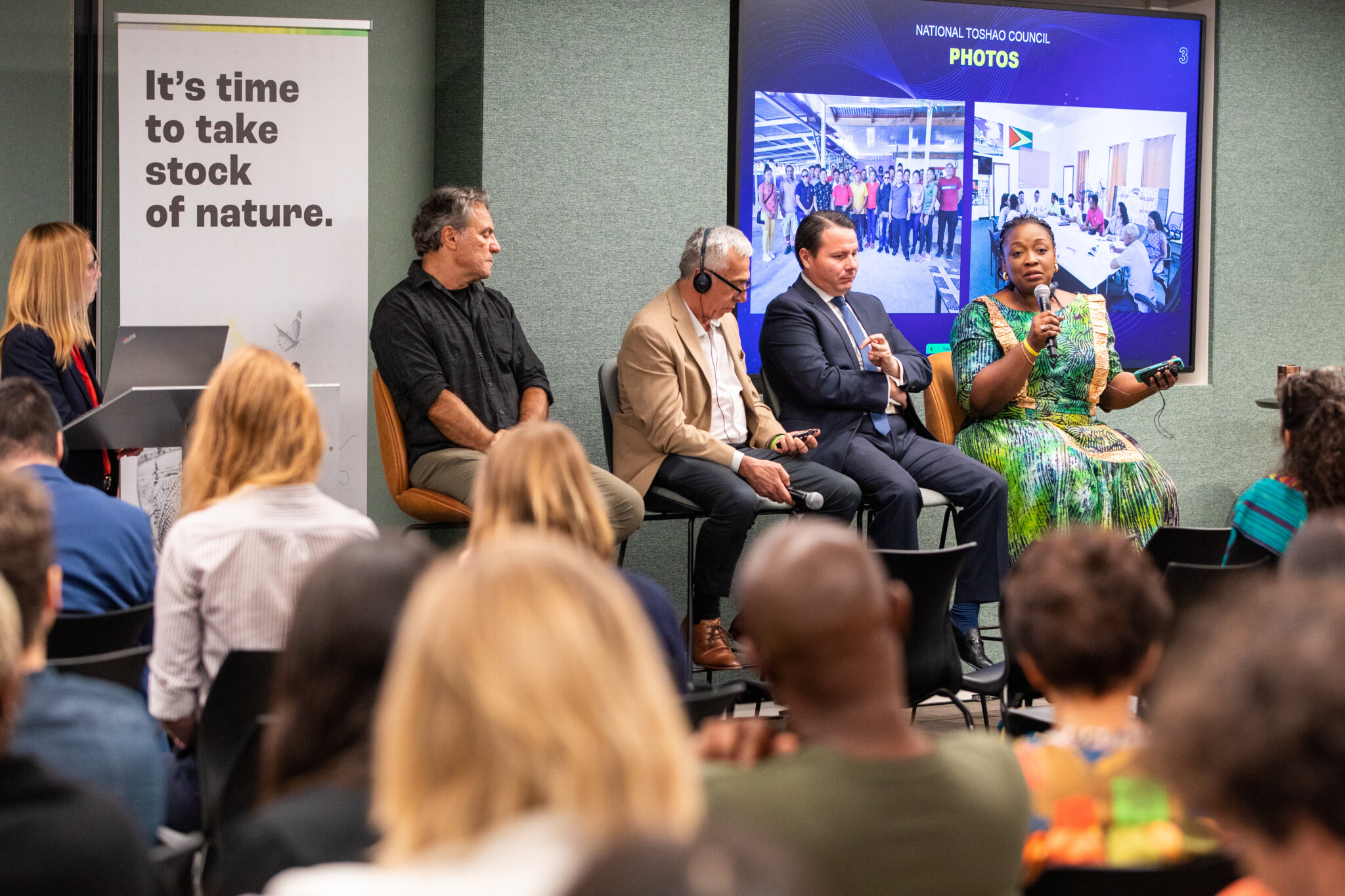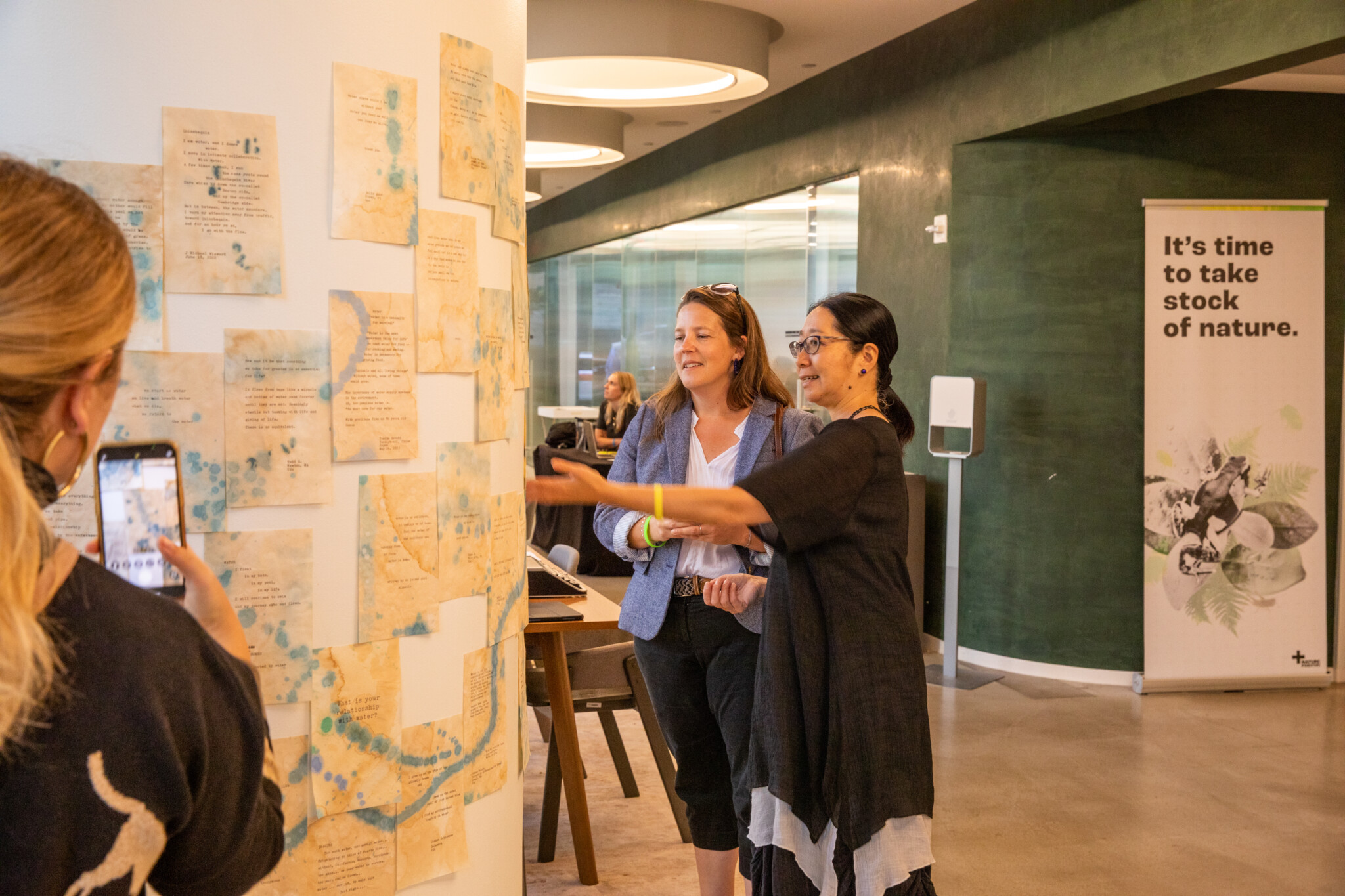
Photos: Basil Childers/Better Worlds
The Nature Positive Hub Initiative, an effort dedicated to championing a Nature Positive future, seized the spotlight during New York Climate Week. This pioneering initiative underscored the pivotal role of nature in every decision-making process, providing communities with essential tools, communication strategies, and support to expedite the adoption of high-integrity Nature-based Solutions (NbS).
The three-day event resounded as a unified call, emphasizing the immediate imperative of positioning nature at the core of climate solutions and events related, as well as a driving force to reduce biodiversity loss. Over 1,750 individuals participated in the diverse array of 49 events hosted by the Nature Positive Hub, showcasing the initiative’s impact and the burgeoning growth of the NbS community.
“The high level of interest surrounding the hub and the broader movement prompts us to consider renaming NYCW to ‘Climate and Nature Week’, given the prominent role of nature-focused events”, suggests Lucy Almond, N4C Chair.
Read our round-up of the event:
MONDAY SEPTEMBER 18TH

Unlocking the catalytic potential of private finance to align a net zero and nature positive future
UN High-Level Climate Champions
H.E. Razan Al Mubarak, the current UN Climate Champion for COP28, joined partner organisations to facilitate meaningful discussions and knowledge sharing among financial institutions, policymakers and environmental experts. The event discussed solutions to bring private finance into play for NCS, the importance of IPLC-led direct access funds for climate and nature, and how public finance can be used to unlock private capital. At the event, the UN High-Level Champions called upon private financiers to take action with six concrete suggestions.
Collaborating for Scaled Investment in Forests and Nature: Forest Investor Club
WBCSD
The session highlighted the importance of investing in nature-based solutions and the value of partnerships between public and private investors to scale up investment. Opening remarks touched on U.S. government support for collaborative efforts to scale investments and emphasized that nature-based projects provide income to people and support ecosystems on the ground. The Forest Investor Club (FIC) released its first annual report, assessing current barriers to investing in NBS in emerging and frontier markets and case studies of FIC members’ innovative NBS investment strategies.
Nature tech in action
Nature4Climate
This hugely popular nature tech in action event had eight speakers demonstrating how their technological solutions were working in the field and investor speakers to put this emerging sector into context for emerging green venture capital. Each speaker demonstrated the huge potential of nature tech to accelerate high-integrity nature-based solutions and the need to rapidly share knowledge, ideas and expertise if we are to scale nature tech to its full potential.
Lifting the Lid: how high-quality, nature-based carbon credits are made
NCS Alliance
This event helped attendees understand the origins of Natural Climate Solution (NCS) projects and the critical steps involved, including project feasibility, planning, execution, and verification of results. Also discussed was the importance of NCS credits in the market and the multitude of actors involved in their development.
Effective Participation of Indigenous Peoples and Local Communities in Jurisdictional REDD+
Environmental Defense Fund
This panel session dove into several examples of the effective participation of Indigenous Peoples and Local Communities (IPLC) in jurisdictional REDD+ in Central America, South America and Central Africa/Congo Basin. The session provided concrete examples of how to enhance the inclusion of IPLCs in the development of natural climate solutions.
How companies can contribute to a nature positive future
Business for Nature, WEF and WBCSD
In the lead-up to New York Climate Week, Business for Nature, WBCSD and the World Economic Forum launched new guidance that sets out the priority actions businesses across 12 sectors must take to contribute towards a nature-positive future. This session at the Nature Positive Hub raised awareness of the sector’s actions to an international audience, engaging companies to scale and speed up action towards a nature-positive economy by 2030, showcasing examples of companies already taking action and demonstrating how the sector actions align with other frameworks.
From Communities to Partnerships: Catalyzing Investments to Scale Natural Climate Solutions
The Nature Conservancy
This reception successfully showcased a range of Natural Climate Solutions (NCS) that demonstrated scalability through science, partnerships, finance, and policy frameworks; providing a unique opportunity for attendees to engage with experts and foster meaningful discussions on securing land tenure, financing, and amplifying the voices of Indigenous Peoples and Local Communities within the NCS landscape.
TUESDAY SEPTEMBER 19TH

Net-Zero Throughout the World: Decarbonizing the Agricultural Supply Chain
The Nature Conservancy
The Net-Zero Throughout the World: Decarbonizing the Agricultural Supply Chain panel dove deep into three levers we need to pull to decarbonize our food system: working with farmers, facilitation through partnerships, and utilizing finance to drive change. The session used case studies from China, Brazil, and Canada to look at the problem and its solution through a global lens.
Power with Purpose: How to Accelerate a Clean, Green, and Equitable Energy Future
The Nature Conservancy
This event focused on how clean energy projects can amplify social and environmental priorities, highlighting their potential to address climate change, conservation, and community needs. Industry leaders and experts discussed purpose-driven approaches to mitigate conflicts and promote the scaling of innovative initiatives in the renewable energy sector and called for the development of voluntary market standards to further incentivize and accelerate these projects.
Achieving Scale: VCM’s Role in Ambitious Climate Action Through REDD+
Wildlife Conservation Society
At this event, government and Indigenous stakeholders at the forefront of this transition to large-scale REDD+ systems reflected on their experiences evolving from REDD+ readiness to operationalizing projects/programs that can secure premium pricing for high quality forest carbon credits in global carbon markets. Market actors provided context and further understanding on the state of the VCM and what supply-side stakeholders should expect and be planning for as they build out these programs.
Bringing Rio Conventions to life through women’s leadership in climate and biodiversity agendas
WWF International, CARE-WWF Alliance and Agroecology Coalition
Within the framework of a discussion on the importance of women’s involvement in implementing the Climate, Biodiversity and Land Conventions, this panel of experts from diverse perspectives explored the barriers and opportunities for supporting women in identifying and leading climate change mitigation and adaptation solutions in communities around the world. The session included reviews of policies that focus on women, case studies illustrating the positive impact of their involvement in programs around the world, and the need to involve men and boys in championing women’s leadership.
Net-Zero Target Setting for Banks in the Agriculture Sector: Unpacking Complexity
WBCSD
This session featured a lively workshop-style discussion on baselining and data challenges, target-setting approaches, and considerations for nature, deforestation, and land use change impacts for banks. The session opened with comments from UNEP FI on the Net Zero Banking Alliance (NZBA) and the importance and complexity of banks understanding and setting targets for their ag and food portfolios, along with background on Banking for Impact on Climate in Agriculture (B4ICA), which is led by WBCSD.
Coffee & Chocolate’s Role in Protecting Our Forest
Conservation International
This event shared supply chain climate mitigation strategies and community-based sustainable agriculture projects from corporate leaders like Starbucks, Walmart and Mars. Presenters stressed the importance of looking beyond compliance strategies and highlighted investments that will help reach Nature Positive goals.
Scaling Indigenous Peoples and Local Communities Access to Climate and Biodiversity Finance
Conservation International
Indigenous Peoples and local community leaders headlined this event sharing their stories of environmental stewardship and challenges to access climate finance. Key takeaways include that despite significant increases in climate finance over the past few years representation in national and international decision-making processes, and financial for Indigenous Peoples and local communities, remains low.
How to buy high-quality, nature-based carbon credits
NCS Alliance
This event highlighted the Buyer’s Guide to NCS Carbon Credits and the available resources to help carbon credit buyers understand how to overcome challenges in finding and procuring high-integrity carbon credits.
Driving growth in the market for jurisdictional REDD+ credits
Environmental Defense Fund, Emergent, and the LEAF Coalition
Driving growth in the Voluntary Carbon Market for Jurisdictional REDD+ credits (JREDD+) is the most effective way to scale finance to help climate, nature and people. The expert panel will convene a diverse group of stakeholders, from companies to forest governments, to IP&LC groups and civil society, to discuss how they can work together to grow the market for high-integrity forest carbon credits to help reach a net-zero, nature positive future.
WEDNESDAY SEPTEMBER 20TH

Can Nature Foster Equity When it Comes to Adapting to Extreme Heat?
The Nature Conservancy
Speakers at this event focused on the disproportionate impact of extreme heat on marginalized communities worldwide, emphasizing that climate adaptation strategies cannot be one-size-fits-all. Highlighting the importance of equity in addressing climate adaptation, the conversation explored the potential of NBS in assisting both people and ecosystems in adapting to climate change.
Nature Positive Hub: NBSAP Accelerator Partnership Operational Launch
Colombia,Germany, UNDP, UNEP, and the CBD
The operational launch of the NBSAP Accelerator Partnership – a new initiative that aims to strengthen the capacity of countries to deliver on their National Biodiversity Strategies and Action Plans (NBSAPs) and spearhead efforts to foster collective action to address the urgent biodiversity crisis and deliver the Kunming-Montreal Global Biodiversity Framework (GBF).
Using the TNFD LEAP process to tackle deforestation
Global Canopy and Frontierra
Event organizers shared guidance on how investors can utilize deforestation as a useful entry point for financial institutions conducting a Taskforce on Nature-related Finance Disclosure LEAP assessment for the identification and assessment of nature-related issues.
Working Together to End Financed Deforestation: Forest Finance Risk Consortium
WBCSD
This session featured the Forest Finance Risk Consortium (FFRC) and its new report sharing guidance frameworks and tools for investors to access data, perform analysis and implement actions towards zero-deforestation investment and lending portfolios. A panel provided an overview of the changing regulatory landscape and shared examples of leadership in curbing deforestation by companies and investors.
Stop the Amazon Tipping Point: Designing a Pan Amazonian Network on Bioeconomy
Conservation International
Attendees of this event discussed the importance of developing the Panamazonian Bioeconomy through diverse partnerships and designing a new economic environment to protect the Amazon rainforest. Panelists discussed how focusing investment on the bioeconomy and working together across sectors – private, public and nonprofit – can unlock the economic potential of the region’s bioeconomy while supporting Indigenous Peoples and local communities.
Why buy? The business case for using nature-based carbon credits
NCS Alliance
This session shared the science behind high-integrity carbon credits and the business case for making future investments. The session highlighted that carbon credits can provide more benefits than just carbon mitigation and can support people around the world.
Developments in Nature Scenarios
The Taskforce on Nature-related Financial Disclosures
A panel of experts, including representatives from companies that have already begun working with nature scenarios already, discussed with the audience on the thinking and use of nature scenarios. Along with the recommended disclosures, TNFD is releasing guidance on scenario analysis, among other topics. This work, as well as the exploratory and practical work begun by other organisations, has helped to progress the thinking around nature scenarios.
The Tropical Forest Credit Integrity Guide: Catalyzing finance for tropical forest conservation through the voluntary carbon market
Environmental Defense Fund
In this panel discussion session, panelists provided an overview of the Tropical Forest Credit Integrity Guide, explained how the Guide complements other emerging initiatives, and shared perspectives on the role it can play in the broader carbon market landscape. Companies can use this resource to help build their climate portfolios while initiatives like the IC-VCM, SBTi and others develop guidance for the voluntary carbon market.
Carbon Finance for Indigenous Peoples and Local Communities
Peoples Forests Partnership
At this event, Indigenous Peoples shared their experiences with accessing climate finance, and ideas on to make climate finance a more effective tool for conservation and sustainable development. Among the ideas discussed to scale up rights-based climate finance were (1) Equitable Earth, a new voluntary carbon market standard that seeks to end deforestation and biodiversity loss by driving finance to these communities, (2) the Climate Justice Standard, an initiative by the UC Center for Climate Justice that certifies climate mitigation projects undertaken by these communities, and (3) the Shandia Platform which facilitates the flow of capital from donors to these communities.
Café com Brasil – the road to COP30
The Nature Conservancy
Brazil is set to host the 30th edition of the UNFCCC Climate Change Conference in just two years’ time, marking a crucial moment for nature and climate action. This session invited representatives of critical sectors of climate action in Brazil to understand better the desired outcomes, priority agendas and ideas for collaboration in creating a shared vision for the delivery of COP 30 and achieving meaningful action on nature by 2030 – over a cup of cafézinho.